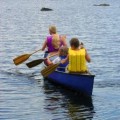Steve: Tell me, where is Mark off to by the way? I didn't quite get that. Jill: Apparently his wife Kindrey and his children and another couple and Mark are going to spend the weekend on Saltspring Island.
Steve: Ok, it might be worthwhile pointing out where Saltspring Island is.
Jill: I'm not entirely sure. Steve: All right but it might be worthwhile for people who may be, you know, be located somewhere else. We, here in Vancouver are on the mainland. We're on the west coast of North America and just off the mainland here is an island, a large island which is about the size of Taiwan actually if you want to put a size on it. It's quite large, called Vancouver Island and of course, the capital of the province of British Columbia is on Vancouver Island. It's Victoria and that is for the very simple reason that when European people first came here there was no railway and there was no way to get here over land so they came by boat. So the first place they went to was Victoria, which is on the island of Vancouver. There is an archipelago, in other words there is a tremendous number of small islands between here and Vancouver Island and south of Vancouver Island. One of those is Saltpring Island. We don't know which one, but all of the islands are very pleasant. Because there is a mild current that goes between Vancouver Island and the mainland, those islands seem to have a somewhat milder climate than we have; milder and drier.
Jill: Yes, I was going to say they tend to get less rain, more sun and less rain.
Steve: I mean I even heard it said that Texada Island is almost like desert like, that it gets very, very little rain which is very strange because we get quite a bit of rain, but because of the currents and the mountains and whatever there are lots of micro climates here and we can normally tell by looking at the vegetation whether it's a wet area or a dry area. More Douglas fir trees would indicate a drier area, more Hemlock and Cedar is a wetter area so there is a lot of variation.
Yeah, they are going off to the island with their kids and they'll probably swim and have fun and that sort of thing. And, Jill what do you do on the weekends? Sleep? No. Not Jill.
Jill: No, no. I'm usually up by 7-7:30am on the weekends. Actually this weekend I'm going hiking and camping at a mountain close to Whistler, near Whistler, called Mount Garibaldi so we'll leave tomorrow and hike and camp and then the next day we're probably going to do a little more climbing and hiking and then come back down. Steve: When you say climbing you are not talking about climbing a rock face here?
Jill: Well, the top part of the mountain is more, it's not a hike, it's actually rock so it is climbing, using your hands and your feet to climb but this is not?. Steve: But you are not tied around the waist and tied to?.
Jill: This time we won't be. I do that but this is not a difficult, technical rock climb so you don't have to have ropes. You can just, you know, you are not going to, probably not going to hurt yourself if you just go up there without ropes. It's not something that is really steep and vertical or anything like that. Steve: But you also climb vertical rock faces?
Jill: Yeah. But I don't go very high. Steve: Spider woman?
Jill: Well, I just started last year because Chris, my boyfriend is very, is an avid climber so I wanted to do a little bit with him but I don't do anything very high or difficult. He kind of does those things with his friend, who he climbs with. I'm a beginner for sure. Steve: Ok.
Jill: Yeah, but we usually do outdoor things on the weekend. Go for you know, at least a good run or a good hike and get some sort of activity in and then just do you know regular stuff like grocery shopping and cleaning the house and that kind of fun stuff.

